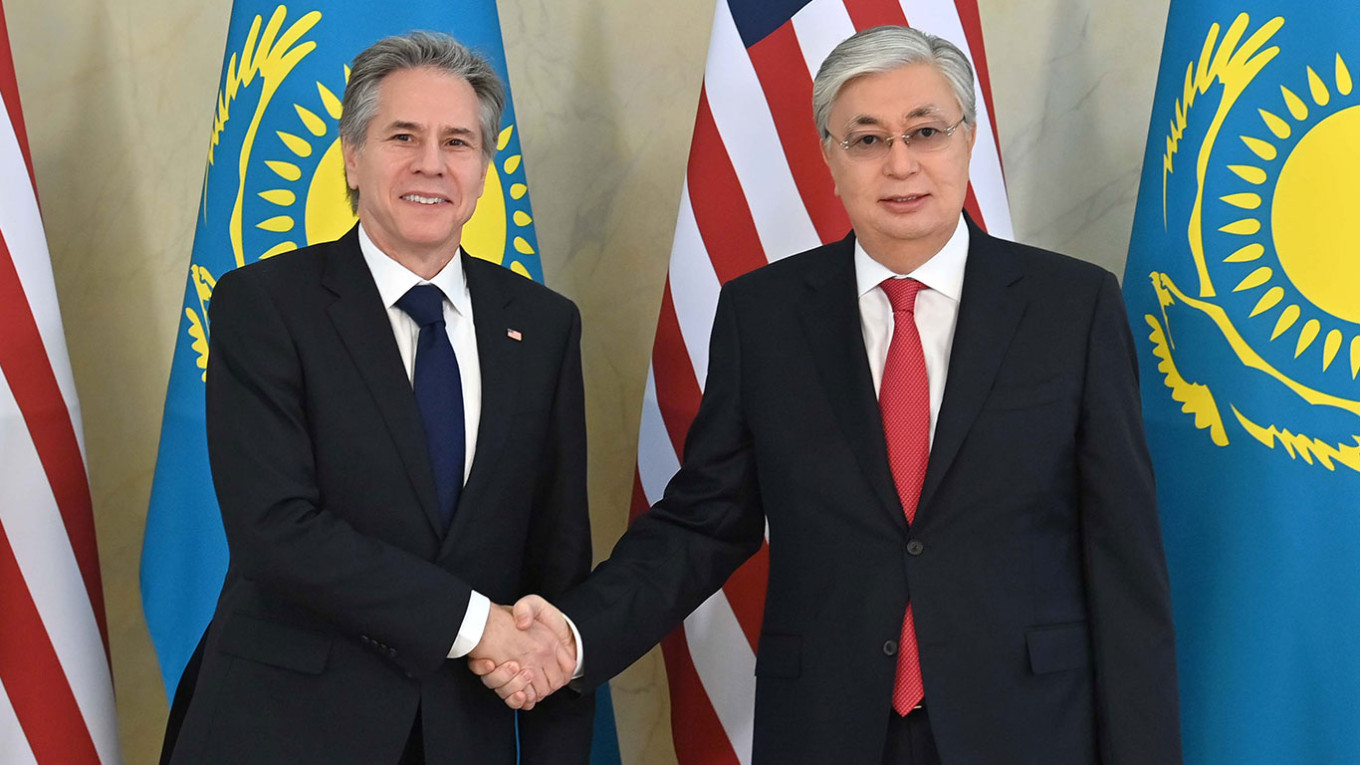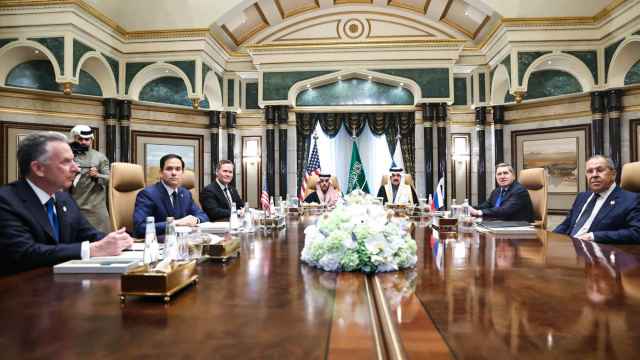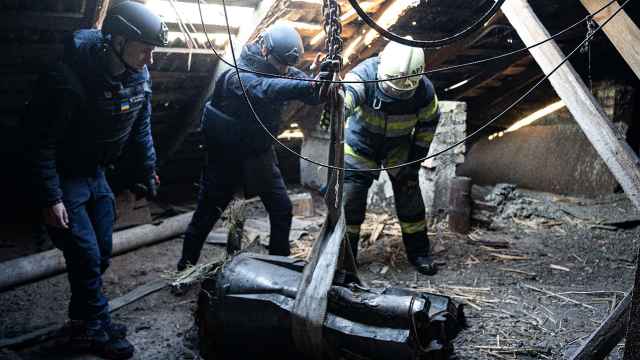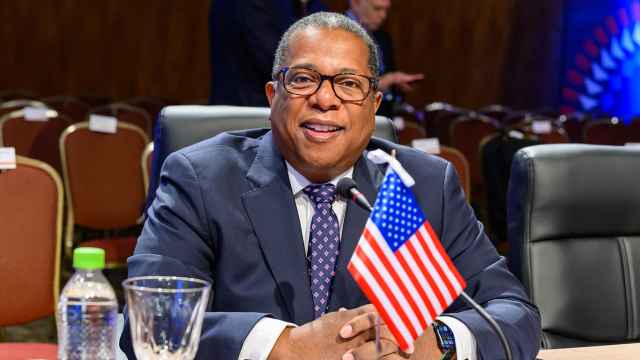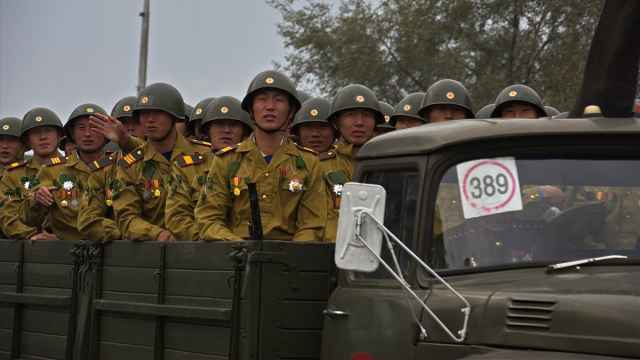Secretary of State Antony Blinken is heading to Central Asia hoping that greater U.S. engagement will reassure former Soviet republics rattled by the Ukraine war, although Russia's historic clout limits the extent of cooperation.
Days after the anniversary of the Ukraine invasion, the top U.S. diplomat will hold talks Tuesday in Kazakhstan and then Uzbekistan and meet jointly with foreign ministers of all five ex-Soviet Central Asian states in Kazakhstan's capital Astana.
Donald Lu, the top U.S. diplomat for South and Central Asia, said the United States was realistic that the five nations were not going to end their relationships with Russia or their other giant neighbor, China, which has been boosting its own presence.
But he said Blinken would show that the United States is a "reliable partner" and different from Moscow and Beijing.
"We have something to offer in terms of engagement economically, but we also have something to offer in terms of the values that we bring to the table," Lu told reporters.
After a year of traveling the world to rally support for Ukraine, Blinken's mission may be his most subtle yet.
Diplomats and experts say that Central Asian leaders are walking a tightrope due to formal security agreements with Moscow and Russia's overwhelming security and economic influence, including as a destination for laborers.
All five abstained or did not vote as the UN General Assembly on Thursday demanded that Russian forces leave Ukraine.
For the United States, "the sky is the limit in Central Asia right now," said Jennifer Brick Murtazashvili, an expert on the region at the Carnegie Endowment for International Peace and the University of Pittsburgh.
"There is a real desire among the leaders of these nations to move away from Russia. I think they realize that Russia is a threat to them, but by geography, there's very little they can do about it, and their economic situation doesn't give them a lot of options," she said.
"So I think there's a real opportunity for the United States to be creative, to engage with the leaders of these countries and sort of meet them where they are."
Complex stance
Kazakhstan, with which Russia has its longest land border, has among the most complex relationships with Moscow. It has been mindful of the rights of its sizable ethnic Russian minority — even more so after President Vladimir Putin pointed to Ukraine's treatment of Russian speakers in justifying his invasion.
Kazakhstan's President Kassym-Jomart Tokayev, who will meet Blinken, last year traveled to see Putin and reaffirmed partnership with Russia.
But he recently spoke with Ukrainian President Volodymyr Zelensky and urged a negotiated end to the conflict based on international law, and Kazakhstan has welcomed tens of thousands of Russians fleeing conscription.
The month before the Ukraine invasion, Tokayev had called in Russian-led forces to help regain control after riots but he quickly asked them to leave following public opposition.
Tajikistan's President Emomali Rahmon made waves in October when a video went viral of him giving Putin a rare public scolding at a regional meeting, accusing Russia of ignoring the interests of the Central Asian countries.
The United States has seen glimmers of hope on human rights, a longstanding concern in a region historically run by authoritarians.
Lu pointed to the recent conviction in Kazakhstan of police officers accused of torture during last year's unrest, as well as Uzbekistan's rapid abolition of forced and child labor in cotton harvests.
"It's really quite remarkable. I don't know that we have seen that sort of speedy progress paralleled anywhere else in the world," Lu said.
Treated as 'backwater'?
The Ukraine war is not the first time that an international crisis has thrown a greater spotlight on Central Asia.
Uzbekistan initially took a leading role in supporting the U.S. military in its war in Afghanistan, which President Joe Biden ended in 2021.
The last secretary of state to visit, Mike Pompeo, in 2020 pushed Central Asians to curb ties with Beijing as he highlighted human rights concerns in Beijing's adjacent Xinjiang region.
Murtazashvili said the United States had made the mistake of seeing Central Asia as a "backwater" linked to other policies and would do better with a strategy that values regional leaders' autonomy.
"These countries are actually in a really interesting position to balance Russia and China off against one another, and many of them have done this pretty skillfully," she said.
A Message from The Moscow Times:
Dear readers,
We are facing unprecedented challenges. Russia's Prosecutor General's Office has designated The Moscow Times as an "undesirable" organization, criminalizing our work and putting our staff at risk of prosecution. This follows our earlier unjust labeling as a "foreign agent."
These actions are direct attempts to silence independent journalism in Russia. The authorities claim our work "discredits the decisions of the Russian leadership." We see things differently: we strive to provide accurate, unbiased reporting on Russia.
We, the journalists of The Moscow Times, refuse to be silenced. But to continue our work, we need your help.
Your support, no matter how small, makes a world of difference. If you can, please support us monthly starting from just $2. It's quick to set up, and every contribution makes a significant impact.
By supporting The Moscow Times, you're defending open, independent journalism in the face of repression. Thank you for standing with us.
Remind me later.


